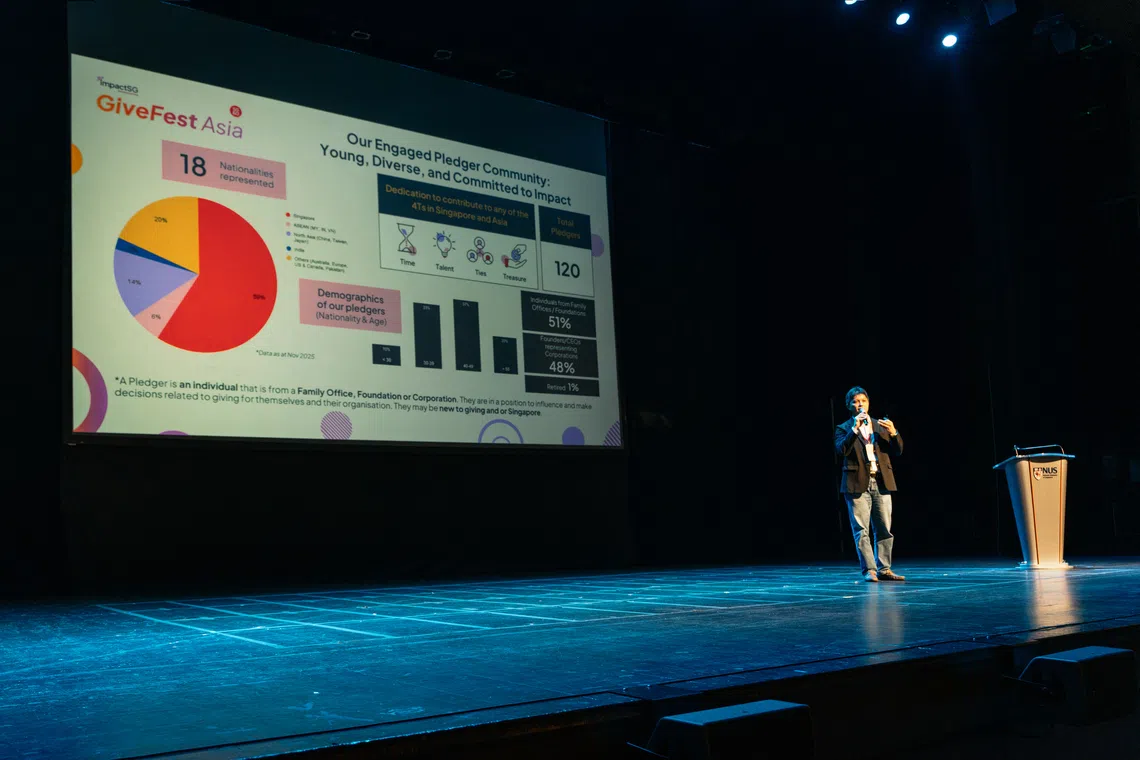Data is an ‘important variable’ in philanthropy, leading to sustained giving: panel
When donors know where their funds are going and how they are making an impact, they will be more inclined to continue giving
[SINGAPORE] As more donors such as family offices and high-net-worth individuals engage in philanthropy, data has become an important factor in ensuring that giving is sustained over the long term, observed panellists at a discussion on Thursday (Nov 20) at GiveFest Asia.
Dr Chu Chi Meng, group director of the strategy and research group and chief data officer at the National Council of Social Service (NCSS), said: “Giving has become more values-based and cost-driven. When we have that happening in the sector, data becomes a very important variable – where can you get the best bang for your buck?”
Donors are becoming more purposeful about the causes they are giving to, while ensuring their funds are making an impact.
Kevin Teo, head of AVPN’s ImpactCollab platform, added: “If you’ve been engaging in donations, the question that comes up is: ‘What is my donation actually achieving? How is my giving going to be sustained?’. And if you cannot answer that question properly, your giving is probably not going to be sustained – which is a huge loss for the ecosystem.”
When donors know where their funds are going, they will be more inclined to continue giving.
Dr Chu noted that NCSS is looking to fill the data gap and come up with a simplified measurement framework to help social service agencies (SSAs) provide more accountability. He added that it will share insights in due course.
Navigate Asia in
a new global order
Get the insights delivered to your inbox.
“Our job is to raise the capabilities and make sure that there’s transparency in funding and accountability, and talk about outcomes – for which we actually have a couple of frameworks, such as the Sustainable Philanthropy Framework,” he said.
The framework provides tailored metrics to allow businesses to measure the impact of their giving and volunteering efforts.
Dr Chu added that SSAs can use such measurements to build trust with donors, “if we demonstrate how we use the funds in a callable manner”.
Therefore, the panellists also noted trust as an important factor in facilitating sustained giving.
Teo Kai Xiang, deputy director and head of banking, private wealth management, family offices and philanthropy at the Monetary Authority of Singapore (MAS), said: “Striking the right balance is about setting expectations for evidence and having very clear, honest dialogues with donors from the onset to build mutual trust.”
The trust between donors, intermediaries and organisations also helps to build confidence in the giving ecosystem, which leads to greater impact.
“Trust means that we need to be credible and reliable stewards of resources, which we have been entrusted with, and that also means that we should be transparent about how the funds are used,” Dr Chu added.
The panellists also said greater collaboration in the industry is needed for sustained giving, and many parties are working together to make it easier for donors to give back purposefully.
GiveFest Asia
The panel discussion, titled “The Giving Landscape: Trends, Incentives, Innovation and Impact”, took place at the inaugural GiveFest Asia, organised by non-profit ImpactSG.
Edmund Twohill, executive director and co-founder of ImpactSG, said: “For our anniversary, we wanted to see how we could value-add to the ecosystem, by bringing our pledger community, like-minded partners and charities together.”
At the event, nearly 50 charities and social service organisations set up booths, where they could connect with donors and others in the philanthropic sector.
Ivy Tse, chief executive of Halogen Foundation, shared: “Events like GiveFest Asia create a rare, shared space where givers, non-profits and partners can be in the same room to have honest conversations, and learn from one another. For family offices and other entities that want to do good, it forms a more strategic and collaborative journey of giving.”

ImpactSG was launched a year ago to foster a community of givers in Singapore and Asia. In 2025, it helped to commit more than S$4 million to various causes.
Ravi Menon, board chairman of ImpactSG, said: “As a hub for wealth and talent, Singapore has considerable philanthropic resources… There are more than 2,000 single-family offices and 400 registered trusts, foundations and impact funds.”
The non-profit has so far anchored around 120 pledgers from family offices, philanthropic foundations and the private sector. It connects pledgers to organisations aligned with the causes they want to support.
For example, ImpactSG works with partners to organise dialogues and learning journeys. In 2026, it will focus on PledgeX, an onboarding programme to guide pledgers on their giving journeys, as well as Community Hour, a marketplace-like event for charities to pitch directly to pledgers.
Decoding Asia newsletter: your guide to navigating Asia in a new global order. Sign up here to get Decoding Asia newsletter. Delivered to your inbox. Free.
Copyright SPH Media. All rights reserved.

